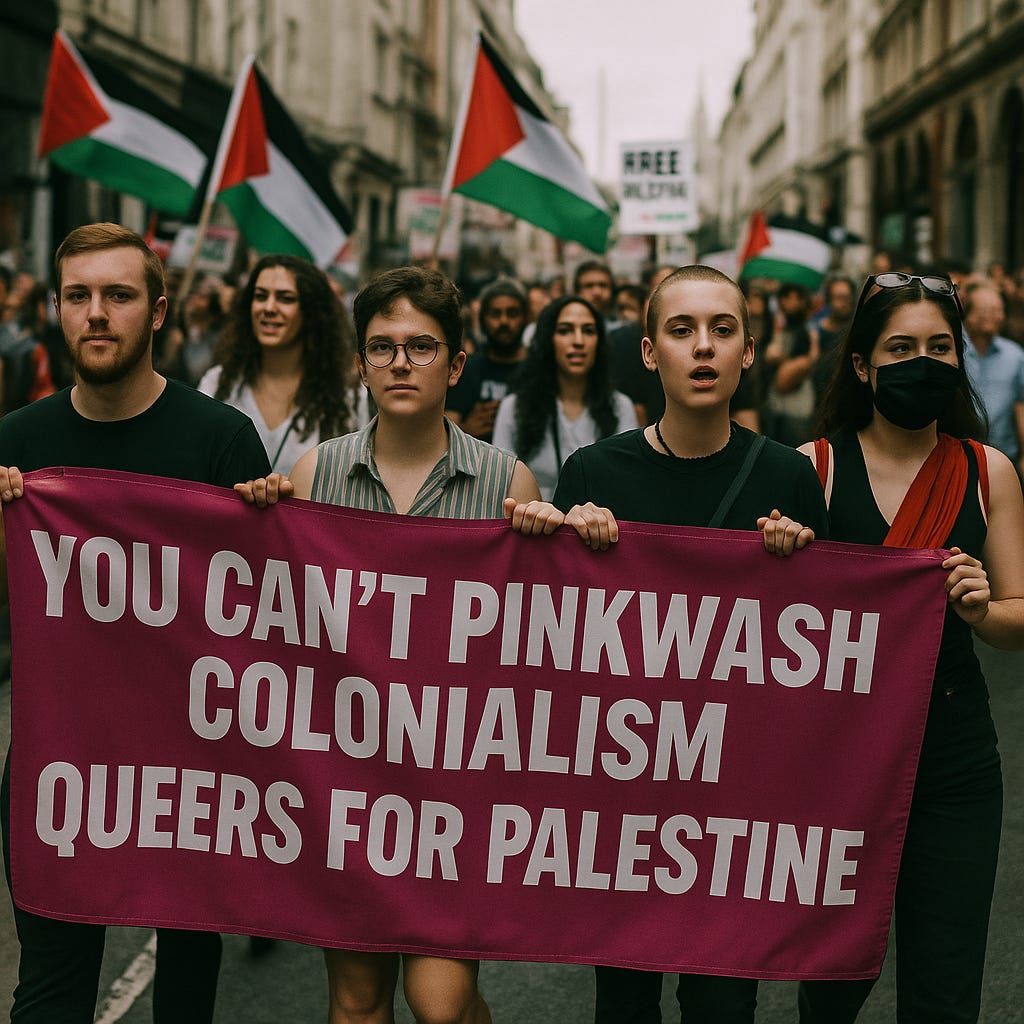Siding With the Executioner: The Paradox of Queers for Palestine
“Queers for Palestine” is not a contradiction but a nihilistic affirmation of self --ideological purity pursued at the price of existence, also evidenced in Charlie Kirk's murder.
This essay is a personal reflection to try to make sense of how self-identified queer people can support Hamas killers who would not hesitate to murder them. It is not the usual material I share here, but I thought some readers might appreciate this line of inquiry if they, too, have been puzzled by what appears, at first sight, to be an absurd contradiction. If this isn't your cup of tea, don’t sweat it: ignore it.
I wrote this reflection a few days before Charlie Kirk was murdered. If it is true that his assassin had a trans lover, the link between murderous terrorists and trans culture just got a bit tighter, and the relevance of the connecting ideas just got more interesting. To make sense of that, I also wrote the Post Script below.
A year ago, Zakarya Rida Hussein was sentenced to six years in prison on terrorism-related charges, including plans to bomb Calgary’s Pride Parade in 2023. I will confess that since then, I have been trying to understand somewhere in the back of my mind how, in light of these things, there can be people such as Queers for Palestine. Remember that the Hamas killers attacked a music festival bubbling with young people, some of whom were very liberal, pacifists, sympathetic to queer culture, and there may have been a few homosexuals among them.
Most people encountering the slogan “Queers for Palestine” are genuinely puzzled. At first glance, it seems a contradiction. How could sexual minorities, who are despised and often violently repressed in Palestinian society, align themselves with movements like Hamas? How could those who march under the banner of sexual liberation stand in solidarity with people who would imprison, beat, or execute them for who they are?
If this is not a contradiction, it is at the very least a paradox. A paradox, according to the Oxford English Dictionary, is “a statement or proposition which, despite sound (or apparently sound) reasoning from acceptable premises, leads to a conclusion that seems senseless.”
To begin making sense of this paradox, one must first understand the cultural ethos of queer and trans politics in the West. At its core lies an affirmation of the self over the world. Queer identity is not framed as a discovery of one’s natural place within a larger order but as an assertion of will against social and natural constraint. A male body may declare itself female, and the declaration is truth; biology, tradition, and reality are compelled to give way before the sovereign act of self-identification.
The ethos is not simply one of sexual freedom, but of metaphysical primacy: the idea is truer than the physical body, the person’s will stronger than nature. In this way, queer culture insists that the authentic self is whatever it declares itself to be, and to question or deny that declaration is disagreement and an act of violence against s/he that declares it.
This self-sovereignty often takes the form of treating one’s former self as dead. That is why trans activists oppose “dead-naming:” to utter their old name is to resurrect a ghost that must remain buried. Yet this death is only symbolic, not actual; it exists in the realm of idea rather than fact. Still, it reveals a deeper morbidity. Many who transition describe themselves as having felt “dead inside” before. Through surgical transformations, they embrace sterility, cutting off the possibility of reproduction — a generational death that mirrors the symbolic one. In this way, queer affirmation becomes Kirilovian: freedom dramatized not through flourishing but through the destruction of natural continuity, proving the self by negating the past and sacrificing the future.
Islam in its traditional form represents the exact opposite. If queerness is the exaltation of will, Islam is the submission of will. The word Islam means submission to God and to divine command, patriarchal order, and the disciplines of family and tradition. Sexual permissiveness is condemned as sin, patriarchal authority is upheld, and in its most radical forms, homosexuality is not tolerated but punished by death.
In Gaza, queerness is not celebrated but hunted and punished. For Islamic law and custom, queer identity is indulgent chaos, rebellion against the divine order, and a threat to family and traditional authority. For queer activists, Islam represents patriarchy, misogyny, sexual repression, rejection, and violence. By any straightforward reckoning, these two worldviews are different and directly antagonistic. Yet it is precisely here that we find the strange phenomenon of Western queer activists marching in solidarity with those who despise them and wish to eradicate them. How does it work?
Keep reading with a 7-day free trial
Subscribe to Haultain Research to keep reading this post and get 7 days of free access to the full post archives.



